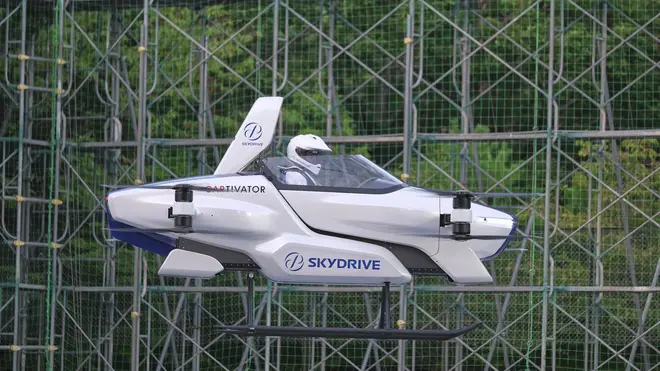
Ian Payne 4am - 7am
1 September 2020, 16:14

In a video shown to reporters, the contraption lifted several feet off the ground, and hovered in a netted area for four minutes.
The decades-old dream of zipping around in the sky as simply as driving on roads may be becoming less illusory.
Japanese company SkyDrive, among the many “flying car” projects around the world, has carried out a successful though modest test flight with one person on board.
In a video shown to reporters, a contraption that looked like a motorcycle with propellers lifted several feet off the ground, and hovered in a netted area for four minutes.

Tomohiro Fukuzawa, who heads the SkyDrive effort, said he hopes “the flying car” can be made into a real-life product by 2023, but he acknowledged that making it safe was critical.
“Of the world’s more than 100 flying car projects, only a handful has succeeded with a person on board,” he told The Associated Press.
“I hope many people will want to ride it and feel safe.”
The machine so far can fly for just five to 10 minutes but if that can become 30 minutes, it will have more potential, including exports to places like China, Mr Fukuzawa said.
Unlike aeroplanes and helicopters, evtol (electric vertical takeoff and landing) vehicles offer quick point-to-point personal travel, at least in principle.
They could do away with the hassle of airports and traffic jams and the cost of hiring pilots.
Battery sizes, air traffic control and other infrastructure issues are among the many potential challenges to commercialising them.
“Many things have to happen,” said Sanjiv Singh, professor at the Robotics Institute at Carnegie Mellon University, who co-founded Near Earth Autonomy, near Pittsburgh, which is also working on an evtol aircraft.
“If they cost 10 million dollars, no-one is going to buy them. If they fly for five minutes, no-one is going to buy them. If they fall out of the sky every so often, no-one is going to buy them,” Mr Singh said.

The SkyDrive project began humbly as a volunteer project called Cartivator in 2012, with funding by top Japanese companies including car manufacturer Toyota, electronics company Panasonic and videogame developer Bandai Namco.
A demonstration flight three years ago went poorly. But it has improved and the project recently received another round of funding, of 3.9 billion yen (£27.8 million), including from the Development Bank of Japan.
The Japanese government is bullish on “the Jetsons” vision, with a “road map” for business services by 2023, and expanded commercial use by the 2030s, stressing its potential for connecting remote areas and providing lifelines in disasters.
Experts compare the buzz over flying cars to the days when the aviation industry got started with the Wright Brothers and the car industry with the Ford Model T.
Lilium of Germany, Joby Aviation in California and Wisk, a joint venture between Boeing and Kitty Hawk, are also working on evtol projects.
Sebastian Thrun, chief executive of Kitty Hawk, said it took time for aeroplanes, mobile phones and self-driving cars to win acceptance.
“But the time between technology and social adoption might be more compressed for evtol vehicles,” he said.